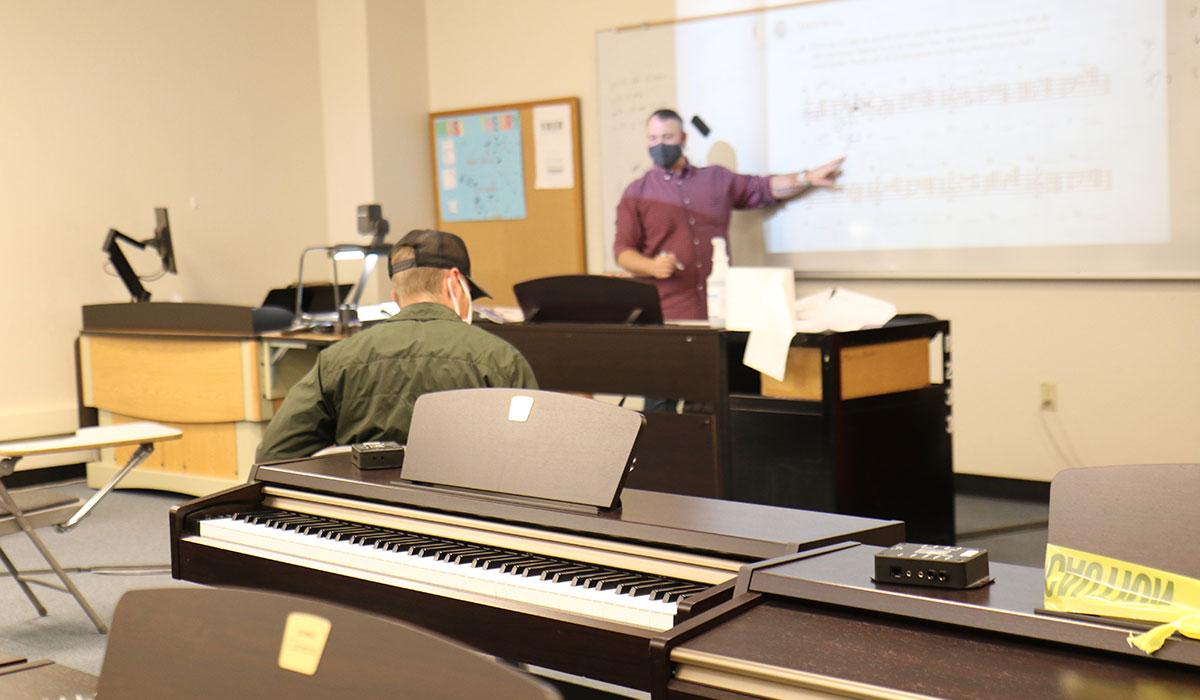
Students in Music Theory, taught by Professor Ted Owens, study rhythm, pitch and harmony in the “piano lab” located in the Red Mountain Building. Owens strikes a chord on the piano next to the lectern, asking students to detect the attributes of those particular chords. Erik Ricardo Soto is a student in the class, and has been taking music classes at TMCC for two years now.
“I got interested in music after my grandfather passed,” Soto said. “He was a violinist. I decided to continue the legacy and started playing string instruments. I play the viola, a tiny bit of piano since I had to take this class. I’ve [also] started to sing recently, and I play the ukulele and I’ve tried a bit of banjo.”
Soto, who is a Fine Arts major at TMCC, plans to transfer to UNR to pursue a Music Education degree. Although he plans to start teaching elementary-aged children, his ultimate goal is to become “...like Professor Owens, teaching music to students at a community college,” he said.
Soto found inspiration for this career path in his classes at TMCC, particularly Music Theory and the History of Jazz where instructors teach the meaning that resides behind the notes.
Why Study the Performing Arts
It’s not just about learning lines in a play, a sequence of choreographed movements in a prescribed space, or even how to play an instrument: an education that includes the Performing Arts prepares students for a rapidly changing world where dynamic critical thinking and rapid problem-solving are quickly becoming assets. “There are a lot of Fortune 500 companies that look for people who have experience in the performing arts because we attack problems differently than other people,” said Owens. “We look at things differently, and we can visualize [possibilities and situations] more completely, and that helps with problem-solving.”
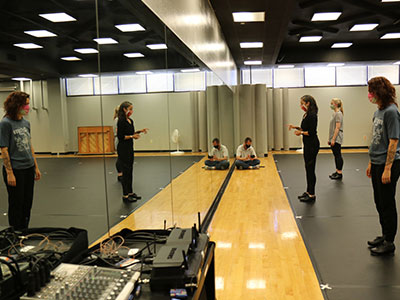
Teaching students to communicate through different mediums translates to real-world communication and problem-solving skills.
In addition to the physical and technical skills associated with music, dance and theater, students can also gain communication, self-esteem and confidence through their work as a developing performing artist. “Confidence and communication are at the very base of the performing arts [...] because we’re teaching students how to communicate through different mediums and at a different level,” said Instructor of Dance, Exercise and Human Movement Dayna DeFilippis. “And [those skills] translate to real-world situations, whether it’s a business meeting or a classroom situation. On top of that, it’s trouble-shooting in real-time—which goes along with the critical thinking skills, self-esteem and confidence.”
And if you think about it, this makes a good deal of sense: dancers constantly work to solve the practical problem of movement paired with music and other performers and the more intellectual challenge of making that movement express an idea or emotion.
Music, too—through the manipulation of an instrument—explores a similar challenge: not only the technical skill required to play a song, but to evoke an emotional response from the listening audience, utilizing yet another kind of communication.
“Communication is extremely important. I think that students gain more from taking a Performing Arts class, whether it’s dance, acting, or music than they would from taking a communications class. That won’t make me popular with our communications and speech instructors {laughing}, but I think it’s a much different problem that they have to tackle in a performance situation over a speech class. You have to deal with interaction, you have to deal with physical space… and those are different skills that [are also a part of] communication,” said Owens.
Keeping Students and Faculty Safe
This semester, Performing Arts faculty were hard at work coming up with creative solutions to include in-person instruction in music, dance, theater and screen printing while maintaining high standards for student and faculty safety. The result was a hybrid model where the theoretical and academic subject-matter is delivered in an online format, while in-person class sessions are utilized for the technical aspects of each discipline.
Even though the hybrid model will remain in place for most classes offered in Spring 2021, there are plenty of classes available to students interested in exploring or continuing their education in the Performing Arts.
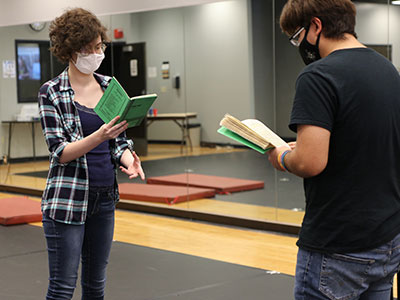
Students in the performing arts can expect a hybrid model that combines online learning with in-person instruction.
“I really do think we’ve found the right balance of being in the face-to-face classroom with social distancing protocols with a limited number of students who are in masks the entire time. We’ve been fortunate to use that model, and do well with it. And our students are doing really well with it… it’s really important to have that physical interaction for what we do and to maintain that relationship with our students,” said DeFilippis.
For students interested in studying music in Spring 2021, TMCC offers Music Theory II, Sight Singing II, both in a hybrid model. Music Appreciation, the History of Rock, and Survey of Jazz will be offered in online formats. The larger ensemble groups, such as concert band and concert choir, will not be offered… yet. “We’re erring on the side of caution with our larger ensembles which attract older community members,” said Owens.
Dance movement/technique classes in ballet, tap, jazz and modern will continue to be offered in a hybrid model. Theater and acting classes will also continue to be offered in this modality.
“We’re also looking to increase our technical students in our theater, dance and music programs who are interested in the design and production side of performance,” said DeFilippis. “Those classes will be taught in a hybrid format where students learn the theory online and the practical skills and projects will be taught in-person.”
The Final World
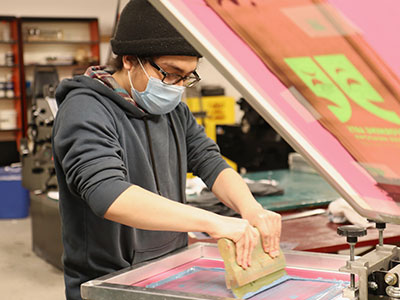
Students in the screen printing class create t-shirts to support the Performing Arts.
Despite the current situation, the TMCC Performing Arts Department continues to think outside of the box to grow and expand opportunities for students to explore the myriad possibilities of stage, sound, music, expression, movement and light.
According to Owens, it is a focus that’s much-needed in the world, especially now. “Lately, there’s a lot of emphasis on STEM [education,] and granted STEM explains the world around us, defining the world and telling us how things work in the world around us. But, the arts explain the emotional world, and tell us how we work,” said Owens. “And that’s really important, especially these days.”
An education that includes the Performing Arts prepares students to adapt to a rapidly changing world with savvy, dexterity and grace as it provides insight into the reasons why we think and feel the way we do... and the methods beyond language by which we express our inner truths, creating meaningful connections through common emotional experiences and empathy.
“I’d definitely tell anyone to study music at TMCC,” said Soto. “The program is really good, and I feel like just doing these music classes has taught me more than I’ve learned in most of my education. It’s fast-paced, but it sticks.”
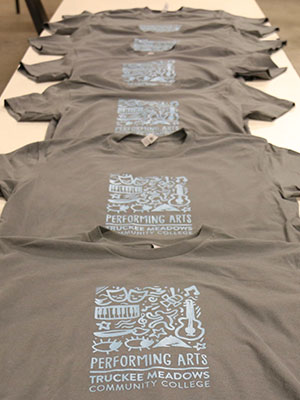
Support TMCC Performing Arts with a $10 donation and receive a shirt printed by TMCC students.
So, stay tuned: there’s a lot to be excited about as the Performing Arts continue to offer their incredible classes in a way that keeps students safe while they explore the depths—and the heights—of the world and our place within it.
Support the Performing Arts
If you are interested in supporting the Performing Arts at TMCC, students in the Graphic Arts and Media Technologies programs have created designs inspired by theater, music and dance that have been printed on t-shirts. The t-shirts are full-cotton blend and available in a variety of sizes and colors.
Contact the Performing Arts office at 775-674-7610, to select your preferred size, design choice, and color. The suggested donation per shirt is $10.
For more information about TMCC Performing Arts, contact the department at 775-674-7610.






